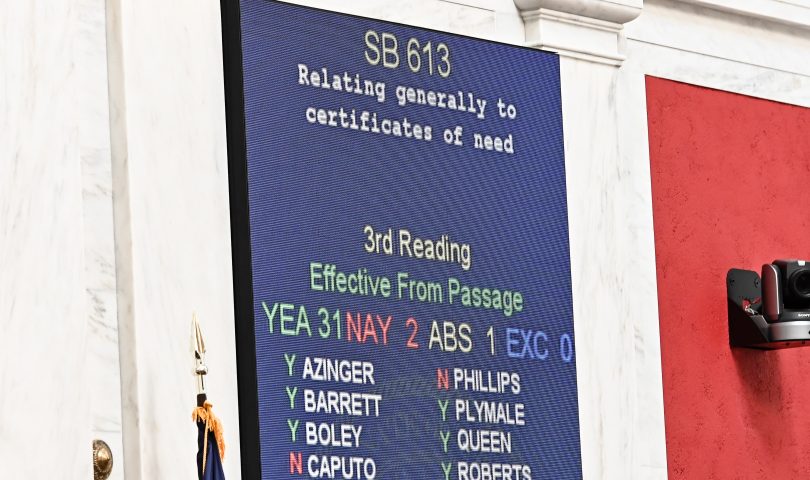MORGANTOWN — Monday’s state Senate actions included booze, health care and schools.
SB 534 began as a cleanup bill for some liquor legislation passed last year, but grew in committee and in Senate floor amendments into a tourism and economic development bill.
Senators adopted a bipartisan floor amendment that allows cities to designate outdoor refreshment areas for the sale, service and consumption of alcoholic beverages. Sen. Eric Nelson, R-Kanawha, said the amendment was spurred by feedback from constituents and members.
Through city ordinance, state-licensed alcohol permit holders would be allowed to establish these outdoor areas for alcohol consumption. An application to the Alcohol Beverage Control Commission would include a map with the area’s boundaries. The plan for the area must include operating hours, security, restrooms and other details. Alcohol would be served in non-glass containers holding less than 18 ounces.
This amendment parallels a House bill that originated out of Morgantown and passed out of one committee, but perished in a triple-committee reference. The Senate version removes some restrictions on population, acreage and number of allowable areas included in the House bill and this bill’s committee version.
Other enhancements to the bill include permitting beer slushies, removing the gallon-production cap for distilleries of all sizes, and allowing a private food court or coliseum/center license where a liquor permit holder could set up and sell alcohol and have restaurants spoked around it without each restaurant having a separate license.
The vote was 25-8, with all eight votes against from Republicans, and it goes to the House.
SB 613 removes some current certificate of need requirements for health care facilities and physician practices.
It expands the size of a hospital campus to include everything within 250 yards of a hospital’s main buildings and exempts everything in that space from CON requirements.
It exempts a private physician office with seven or more office practice locations from a CON to acquire and operate a fixed MRI scanner, with the qualification that at least 75% of the scans are for practice patients.
It exempts from CON anyone wishing to acquire, construct, develop or establish a birthing center.
Health chair Mike Maroney, R-Marshall, and sole sponsor of the bill, which originated in his committee, said the MRI exemption is meant to help those who have to travel from the Eastern Panhandle for services.
Sen. Patricia Rucker, R-Jefferson, said, “This is something that is very important to the Eastern Panhandle.” There’s more to do regarding the CON process but “this is a great first step.”
It passed 31-2, with one Democrat and one Republican voting against it, and heads to the House.
SB 688 would allow county school boards to engage retired teachers as independent contractors to provide reading and math tutoring. The contractor would not be eligible for state benefits, but contracting also would not negatively affect retirement benefits they’re receiving. The bill lists certain criminal offenses that would disqualify a candidate.
Rucker pointed out that some legal aliens with green cards are certified teachers but this bill applies only to citizens. She hopes that might be addressed at some point.
It passed unanimously and heads to the House.
SB 737 is the Emergency Medical Services Act and creates a special revenue account to supplement EMS worker salaries. The money would be sent to a county prioritized on need, existence of a special levy for EMS, a regular levy that’s reached its maximum rate, and competition from border states.
The vote was unanimous and it also goes to the House.
TWEET David Beard @dbeardtdp
EMAIL dbeard@dominionpost.com




